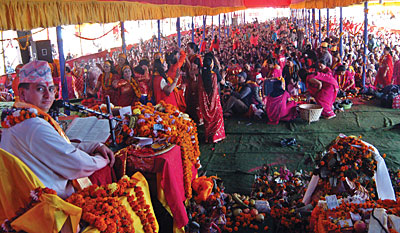 SALIGRAM TIWARI/KANTIPUR |
When the Manmohan Memorial Community Hospital decided to raise money to upgrade to 700 beds and invest in several smaller projects, it held a mahayagya - a nine-day worship marathon - last November. It raised a staggering 4 billion rupees in cash and contributions.
But what was most impressive was not the amount raised (twice what the organisers expected), but the number of people who donated. Over 10,000 visited the yagya site every day, and most donated Rs 5001, which earned them a shawl as a token of appreciation. "We handed out a lot of shawls," says Mani Banskota, co-secretary at the hospital. "I think those who would have given a thousand or two probably donated more because they wanted that recognition."
The event was publicised as a spiritual gathering for peace and stability in the country, but people were clearly motivated by more personally spiritual concerns. Banskota's father Tika Prasad, for example, donated his body's weight in money to cast away the sins from his 78 years on earth.
Philanthropy is not a new trend in Nepal. There are plenty of examples of individuals setting up foundations in the memory of family members, or contributing time to build schools and canals. A group of women built the largest school in Lamjung through muthidan, that is, by raising handfuls of grain.
The unprecedented amount of money raised by the hospital indicated that people are willing to dig deep for charity, but they do want to know what's in it for them. When it comes to parting with cold hard cash, two types of interests seem to be pervasive - recognition by God and society.
When Siddhartha Rana donated Rs 10 million to Help Nepal Network, the charity noted that it was rare for someone to donate to a cause not directly linked to his family. Rana concedes he gave the matter some thought then decided to scrap his own charity, Tara Foundation, so as not to overlap with the activities of Help Nepal. "If in the US, Bill Gates' foundation is trusted by Warren Buffet for his philanthropic activities, why can't we do the same in Nepal?" he says.
In fact, this is how organisations that run on philanthropic donations want people to give � for social causes rather than to boost family prestige or to placate adversarial planets.
"We need to inspire people to give for social justice," says Rita Thapa, founder of Tewa, an organisation that funds women's projects by raising donations from individual Nepalis. "Religious and cultural altruism has held the fabric of our society together. But it is important that people donate for social transformation itself."
Tewa's approach to philanthropy was groundbreaking when it was set up in 1995. Tewa trained volunteers to engage in local fundraising to support their programs. Over the years, it has mobilised almost 500 volunteers, who approach family, friends, and neighbours for donations.
Getting people to recognise good causes is difficult. "In the early days we approached scores of corporate houses for a gift of Rs 50,000. Only one of them gave readily," Thapa says. "Corporate giving is tied with business interests rather than the practice of social responsibility."
Compared to Manmohan Memorial Community Hospital's feat, and two schools that raised Rs 51 million through mahayagyas in Pokhara this week, Tewa's fundraising �Rs 2 million per year � is modest. There's no doubt that philanthrophy is thriving in Nepal. But if you want to raise serious money, you might be better off calling your priest.
READ ALSO:
Junket journalism -FROM ISSUE #492 (05 MARCH 2010 - 11 MARCH 2010)
Junk journalism - FROM ISSUE #493 (12 MARCH 2010 - 18 MARCH 2010)


